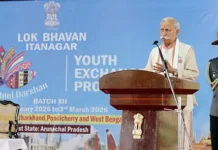ITANAGAR, 5 Aug: The Arunachal Animal Welfare Society (AAWS), in collaboration with Arunachal Dog and Cat Rescue, organised a two-day awareness progra-mme on ‘Public health and animal protection laws in India’, on 3 and 4 August, at the Police Training Centre in Banderdewa and the DK Convention Hall here, respectively.
Over the course of two days, National Rabies Control Programme assistant nodal officer Bomto Riram spoke on “‘Zoonosis and one health’, apprising the participants of the zoonotic diseases and the importance of preserving the environment and ensuring the wellbeing of all animals, including pets, community animals, and farm animals,” the AAWS informed in a release.
Dr Asher Jesudoss from the Delhi Animal Welfare Board spoke about the animal protection laws and the roles of various departments in ensuring animal welfare, care and protection.
He further dwelt on various laws, such as Section 325 of the BNS, and various sections of the Prevention of Cruelty to Animals Act, 1960, and the rules framed thereunder.
He apprised the participants of the “cognizability of offences and the importance of taking crimes against animals seriously,” saying that “cruelty towards animals has been linked to violence against humans by several research papers, as well as cases across the country and the world.”
Dr Jesudoss stressed on “the importance of coordination between the jurisdictional veterinary officer of the animal husbandry department and the investigating officer.”
DSP Chamrak Arun said that “the police force has learnt a lot of practical information about animal protection laws and procedures, including the care and maintenance of case property, as well as the cognizability of crimes against animals.”
He assured animal protection activists that “the police will be supportive in reports of crimes against animals,” the release stated.
ICR Deputy Commissioner Talo Potom, who was invited as a guest, said that he has several pets at home and is eager to initiate the formation of a “society for prevention of cruelty to animals, with government as well as non-government executives.”
“He also supported the declaration of rates for the care and maintenance of case property animals in the district,” the release said.
Potom urged the animal husbandry department to “declare a government veterinary hospital as an infirmary for injured and diseased animals, as well as case property animals.”
The food safety officers attending the programme were encouraged to initiate educational programmes for the public on the harmful effects of dog meat consumption, as well as the benefits of moving to a plant-based diet.
The Itanagar Municipal Corporation (IMC) was urged to initiate an animal birth control (ABC) programme to control the population of dogs and cats in the jurisdiction in a prescribed, compassionate, and legal manner.
Dr Jesudoss proposed conducting a workshop to train the IMC personnel on the procedures and methods involved in running an effective ABC programme.

